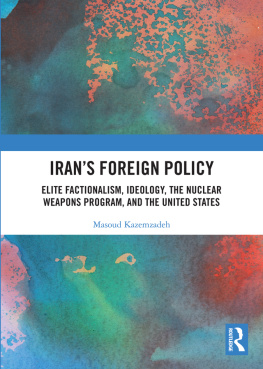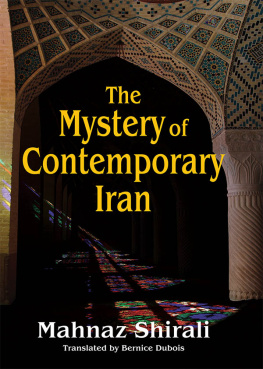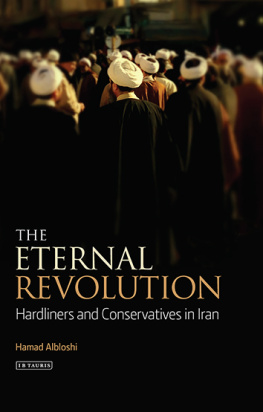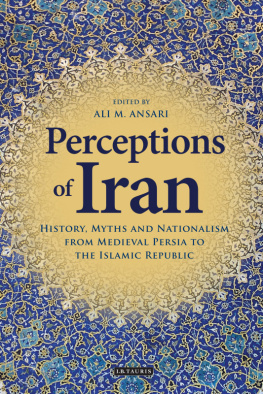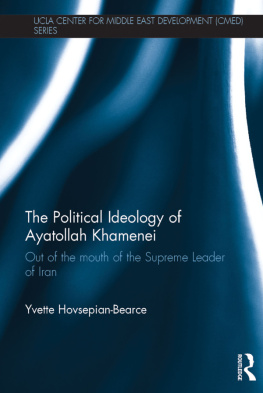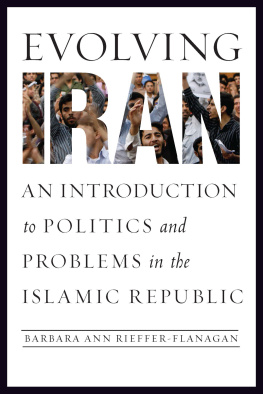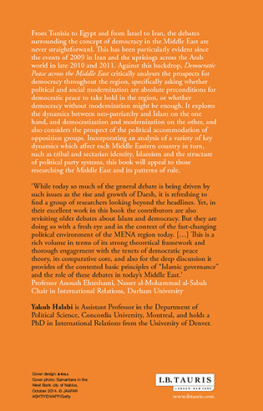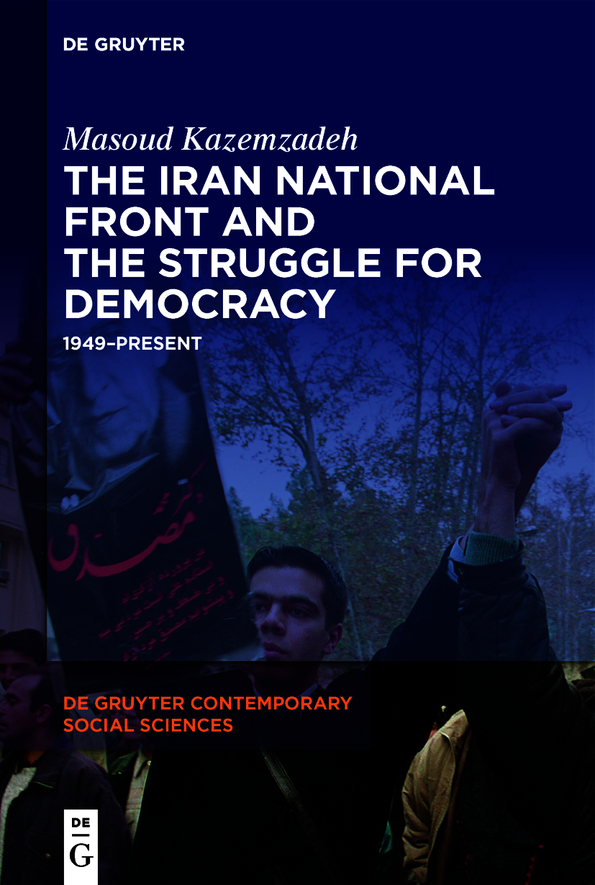De Gruyter Contemporary Social Sciences
Volume
ISBN 9783110782059
e-ISBN (PDF) 9783110782158
e-ISBN (EPUB) 9783110782226
Bibliographic information published by the Deutsche Nationalbibliothek
The Deutsche Nationalbibliothek lists this publication in the Deutsche Nationalbibliografie; detailed bibliographic data are available on the Internet at http://dnb.dnb.de.
2022 Walter de Gruyter GmbH, Berlin/Boston
I dedicate this book to all those who have struggled to establish freedom,
democracy, human rights, and social justice in Iran.
Preface and Acknowledgments
This book deals with highly political and contentious subjects. This research contains segments that attempt to present factual descriptions of the activities of the Iran National Front (INF). This research also contains segments that engage in analysis of the policies of the INF and other political actors. The bulk of this book deals with description. In these segments, I have attempted, to the best of my abilities, to describe the activities and views of the INF objectively. These segments attempt to answer what happened, what the INF did, and what the INF said. These segments have to be objective and factual. If there are any errors of fact, I would most appreciate if the readers and critics would point these out. Such corrections will add to our knowledge and would enhance our understanding of this major subject. If there are documents that my research has been ignorant of, I would be very happy to get access to them. Scholarship is a collective activity. By providing more documents, our knowledge will become more complete. Readers may send me such documents and corrections via my work e-mail. Updates and corrections will be made available through the website of the publisher: https://www.degruyter.com/document/isbn/9783110782158/html.
This research also contains analytical segments. These segments attempt to answer why the INF or other actors did this or that action. There are only a few such segments in this book. All scholars may make errors of judgements or logical inconsistencies. Through criticism and debate, we can understand the shortcomings of our analyses. Consciously or unconsciously, scholars may cherry pick evidence to further a particular analysis. Through debate, we can learn and correct, or debunk such analyses.
Paradigmatic and theoretical frameworks also influence analyses. The primary goal of this book has been to provide an objective description; therefore, this work has avoided theoretical analysis. Those scholars who utilize particular paradigms or theories (e.g., feminism, Marxism) may ask questions or look for areas that my research has neglected. My book is not an all-encompassing work intended to answer all the questions pertaining to Iran. The primary contribution of this book is simply to provide a description of the activities of the INF. Other scholars who utilize various theoretical analyses enrich our understanding of Iranian politics and history.
A heartfelt thanks goes to Penny Watson, who read many drafts of this book and made many constructive suggestions and criticisms. This work owes a great debt to many members of the INF. I thank Kambiz Ghaemmagham and Dr. Homayoun Mehmaneche for their comments and suggestions on earlier drafts of this book. I thank my friend Dr. Mohsen Ghaemmagham for the numerous discussions about the INF. I learned a great deal through e-mail exchanges with Dr. Hussein Moussavian and the late Abbas Amir-Entezam, as well as interviews with the late Khosrow Seif and Dr. Mehrdad Arfazadeh, and conversations with the late Dr. Saeed Fatemi, the late Hussein Razi, the late Abolqassem Lebaschi, and the late Hassan Lebaschi. I am solely responsible for any errors of fact or analysis.
The research for this book began when I was at Utah Valley University. I thank my former department chair and friend, Dr. Keith Snedegar, who provided class release so that I could conduct the basic research. I thank Dr. Jason Enia, my department chair, and Dr. Chien-pin Li, my Dean, for their support of a generous sabbatical leave, which allowed me to complete this book. I thank Faye Leerink, Michaela Gbels, and Gerhard Boomgaarden, my wonderful editors at De Gruyter, for their highly efficient work. It was a pleasure working with them on this project.
About the Author
Masoud Kazemzadeh is Associate Professor, Department of Political Science, Sam Houston State University, Huntsville, U.S.A. He received his B.A. in international relations from the University of Minnesota, U.S.A., and his M.A. and Ph.D. in political science from the University of Southern California, Los Angeles, U.S.A. He was a postdoctoral fellow at Harvard Universitys Center for Middle Eastern Studies. He is the author of Irans Foreign Policy: Elite Factionalism, Ideology, the Nuclear Weapons Program, and the United States (London and New York: Routledge, 2020).
Chapter 1 Introduction
It is often said that Iran lacks strong (or even real) political parties.
Definition and Study of Political Parties
What is a political party? What distinguishes a political party from a real political party? Does Iran possess real political parties? Can one consider the Iran National Front a real political party? What is the relationship between real parties and democracy?
If one person creates a website and announces the establishment of a political party and adds a few pages of the entitys aims, should scholars use the term political party to refer to that entity? If a politician creates an organization for his electoral campaign and calls it a political party, should scholars use the term political party to refer to that entity? If one person in power or a group in power establish an entity to mobilize support and call it a political party, should scholars use the term political party to refer to that entity?
Since 1900, Iran has had hundreds of entities that have called themselves political parties. Akhavi has a much lower threshold on what constitutes a real political party than those by Azimi and Aldrich. Akhavi considers ephemeral entities that have called themselves party as a party.
What do real political parties do? According to Norberto Bobbio, political parties would perform the function of selecting, aggregating and transmitting demands originating in civil society [which would] become objects of political decisions. LaPalmbara and Weiner suggest that real political parties should have four characteristics:
(1)
continuity in organization, or longevity, so that the party is not dependent on the life span of current leaders or regimes;
(2)
manifest and presumably permanent organization at the local level and an institutional relationship between the local and national levels;
(3)
a conscious drive on the part of the leadership to seek governmental power, either alone or in coalition and not simply to influence the exercise of power; and
(4)
a concern on the part of the organization for seeking followers at the polls or in some manner striving for popular support.
Democracy and Political Parties
Clearly, there are parties that advocate democracy and parties that advocate dictatorship. Examples of parties that advocate dictatorships include Italys Fascist Party, Germanys Nazi party, Communist Party of the Soviet Union, and the Chinese Communist Party. In Iran, both the Shah and Ayatollah Khomeini established parties that were anti-democratic. The Rastakhiz Party under the Shah and the Islamic Republican Party (IRP) under Khomeini were created with the purpose of consolidating the brutal dictatorships of their founders (see Chapters 2 and 5). The Shah ordered all Iranians to either join his party or go to jail or leave Iran. One of the main slogans of Khomeinis supporters was


